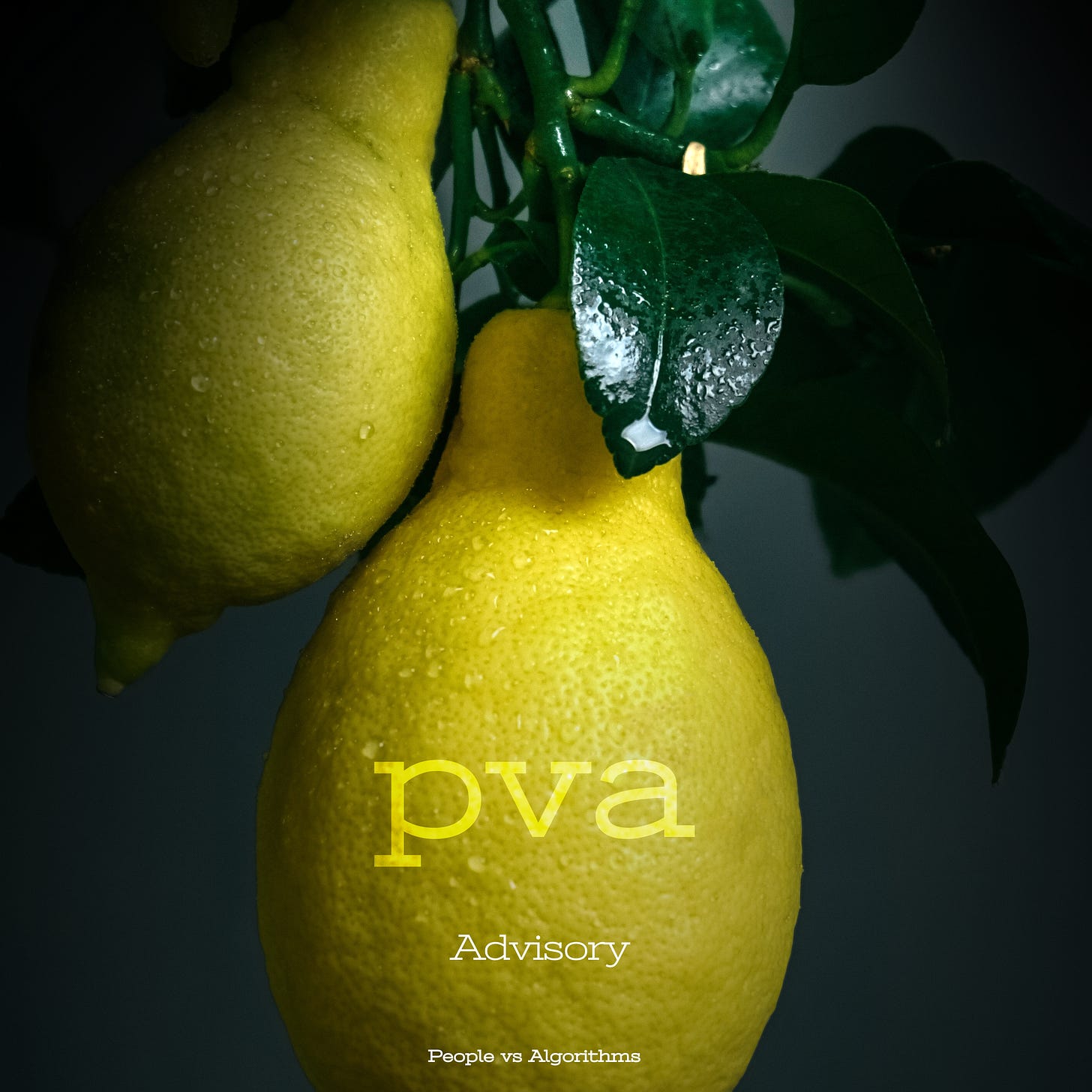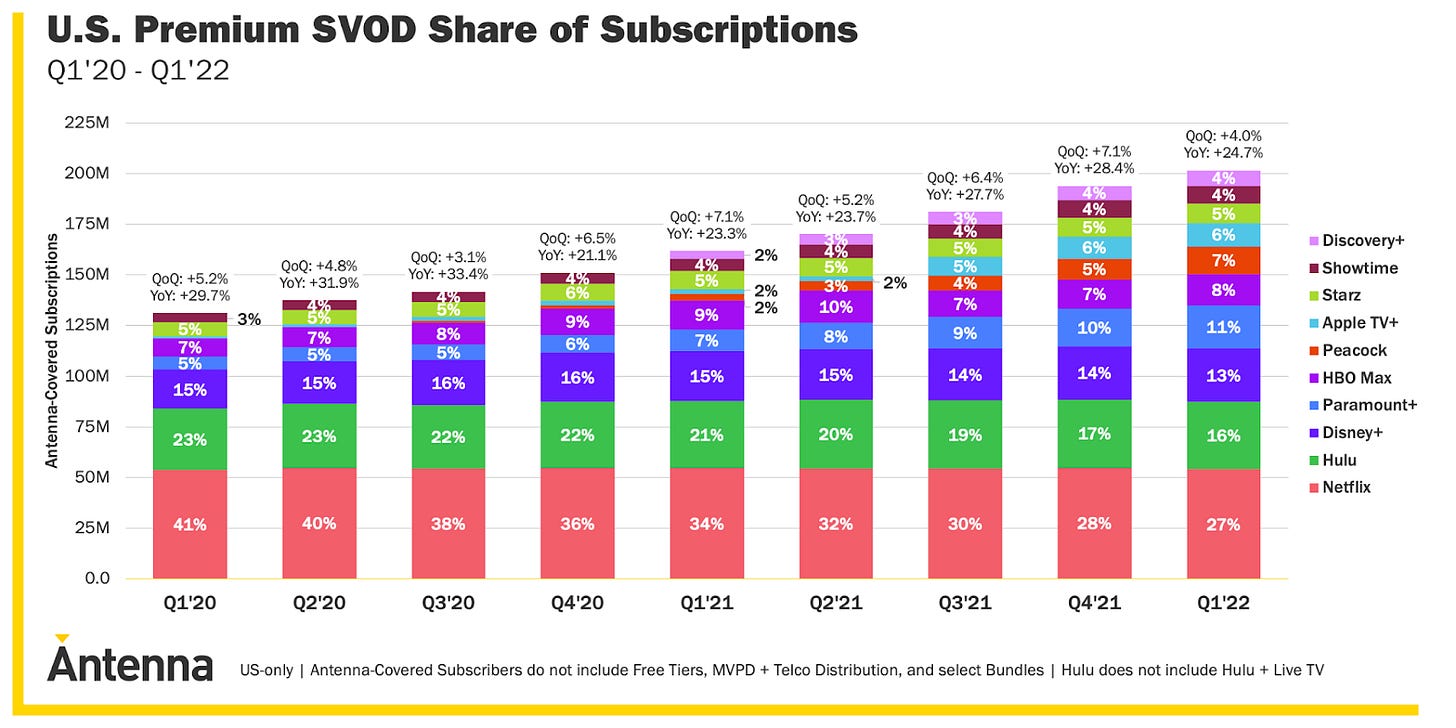Manifesting
Media is perpetual change.
Welcome to People vs Algorithms #29.
I look for patterns in media, business and culture. My POV is informed by 30 years of leadership in media and advertising businesses, most recently as global President of Hearst Magazines, one of the largest publishers in the world.
Get my free weekly email here:
A lot of people are talking about “manifesting” right now. I have been thinking about it too, both in relation to my personal life and the media world more broadly. You will hear the word come up a lot if you watch “We Crashed”, the Apple TV dramatization of the We Work story. Founders, Adam and Rebekah Newman were big fans of manifesting and, while their road to manifestation was bumpy, a near billion dollar settlement at the end of the whole sordid affair might suggest there’s something to it.
I tried to understand the difference between manifestation and it’s old school equivalent, prayer. Seems the difference is a function of self reliance and a connection to other neuro-sciencey stuff. Manifesting is channeling your inner energy into the world with the hope that its force will change the trajectory of things. Praying usually relies on a God to make things right.
Gwyneth Paltrow's trades in maximal manifest vibes. In Goop’s recent podcast, Lacy Philips, a “manifestation advisor” explained it as: “When people stop believing that somebody’s got your back, or Superman is coming, we turn to ourselves. That’s when you become empowered. Courageous participation attracts positive things.” I like this idea.
A friend who uses the word “unbundling” a lot, called the broader phenomenon the “unbundling of religion.” He is a big fan of manifesting and leaning on a broader spiritual support group including his shaman, trainer and acupuncturist. Collectively he calls them his “team of light.”
Cycles of deep change are always manifesting in the media business. Randall Rothenberg, IAB’s former CEO, reminded me of this early this week, pointing to an article he authored for the New York Times over 30 years ago, “Shifts in Marketing Strategy Jolt the Advertising Industry” which proclaimed “After five years of stagnation, the American advertising industry is facing a dim and uncertain future…the nation's consumer market is not what it once was, and advertising agencies are adapting only fitfully to a profound change: the splintering of the mass market into hundreds of smaller markets, and the development of new ways of communicating with them.” This could have been written last week.
He reminded me of the mighty Brill Building, once the center of gravity for the country’s music industry with a business model underpinned by publishing rights and sheet music. Spotify was the piano in the parlor. Technology changes creation and it changes distribution. It has for a long time.
When change becomes so fundamental, surely it should be considered a permanent facet of the business and not really change at all. Medical research is a business of change. So is media. Starting some 20 years ago, the progression toward full on-demand distribution reality became a structural reality of the internet media meat grinder. Everyone has to learn to fight inside of this construct, streaming being the latest example. Adaptability is the key survival skill. Anyone who has lived inside of a digital media company learned this long ago as distribution primacy shifted form portals to social to search, the content syndication imperative changed as social preferences shifted, most recently to TikTok, and as monetization evolved from context / direct sales to data / programmatic to content marketing and then affiliate. Revenue diversification is the only survival strategy — consumption patterns perennially shape shift in the meat grinder. Content creators always sit downstream from platform distributors.
This change is permanent, and no amount of regulatory evolution or platform largess is going to alter the trajectory for content creators. The most recent example of donation plate passing was seen this week with Google agreeing to pay some 300 European news publishers for snippets of content appearing in the feed. This is a welcome diversification line item for the industry but will do little to change structural challenges — consumption is social and concentrated, individuals take up more of the feed, advertising is GMV, subs are hard to grow and overwhelming competitive.
Affiliate revenue, while a welcome revenue addition for many, especially in lifestyle categories, is about to get more difficult in what I expect will be another punch in the face for publishers overly dependent on it. Amazon, the biggest source of revenue in affiliate is eyeing changes to the program that will limit rev share to the recommended product, not the entire cart. And Google, in an effort to make search more relevant for product hunters, will add pressure by making the SKU a more visible part of results pages, reducing opportunity for the publisher referral. Key shopping search positions have become fiercely competitive as affiliate revenue has grown. Google will find itself in familiar territory here, with minor changes materially impacting a very noisy constituency. Roll ups like Recurrent are betting their underwriting models on this revenue. So are DotDash Meredith, Red Ventures, Future, and Ziff. It’s just going to get harder to rely on. Complex categories like finance and insurance will do better because the complexity of affiliate integration with commercial partners will narrow the competitive field.
It’s Friday and the end to a tough and news filled week in media and tech. CNBC is must see TV. Right now, Elon Musk is confusing the speculators while he tries to manifest a better price for Twitter. Ari Emanuel assured skeptics that despite Netflix being 70% off its high, across sport and entertainment, cable and streaming, demand for content is very strong. Coinbase is getting hammered, down 83% from the IPO and fighting off bankruptcy rumors. Their CFO is on doing damage control. Google CEO Sundar Pichai is talking about what all platform companies talk about — innovation, customer experience, mobile and competing with TikTok.
I was reminded that the customer experience mindset is rarely manifest inside of media companies, not because it’s a hard concept but because when you are a content company, you have other things to worry about - content economics, ad yield, diversification and surviving platform shifts. Twenty years into the digital content revolution, publishers pages are as messy as ever, the floating video player the latest delusional effort from publishers and efficiency-seeking media buyers. In world where consumers move from search to article, paywalls proliferation has made the journey endlessly annoying.
Interestingly, Yahoo is one of the few legacy digital companies that has the scale and technical sophistication to balance customer experience, advertising, content and content utilities managing complex data feeds, portfolio tracking, sports betting, etc. I think they will do well despite the critics.
BTW I got my first bit of funny hate mail on account of last week’s post. I love the feedback. Keep it coming. This one read: “…I wanted to write because I hated this newsletter so much. And what is the internet, if not a way to amplify and transmit negative sentiment, right? Here’s my problem with the ‘meat grinder’: Your metaphors matter. Go rewatch the Jeff Bezos TED talk (excellent pull, btw). Meat grinders can’t be what this business is; it has to be either haberdashery or soup-making, but it can’t simply be offals and entrails. We haven’t worked so hard for so little...” Thank you. I’ll work on my metaphors.
Just a short note this week. Lot’s of things to manifest. Some terrific links collected this week below. Have a great weekend…/ Troy
Subscribe now. It’s free:
Other good stuff:
1. Despite deep fragmentation of content, at the top end we see an oligopolist structure. “Pop Culture Has Become an Oligopoly” from Experimental History:
Some of these explanations are flat-out wrong; others may contain a nugget of truth. But all of them are incomplete, because this isn’t just happening in movies. In every corner of pop culture––movies, TV, music, books, and video games––a smaller and smaller cartel of superstars is claiming a larger and larger share of the market. What used to be winners-take-some has grown into winners-take-most and is now verging on winners-take-all. The (very silly) word for this oligopoly, like a monopoly but with a few players instead of just one.
2. An amazing story from Cory Doctorow on how Russian tractor looters were foiled and what the broader consequence might be. “About those kill-switched Ukrainian tractors:”
But if you scratch the surface of that cinematic comeuppance, what you find is a far scarier parable about the way that cyber warfare could extrude itself into the physical world. After all, if John Deere’s authorized technicians can reach out and brick any tractor or combine, anywhere in the world, then anyone who suborns, hacks or blackmails a John Deere technician — say, Russia’s storied hacker army, who specialize in mass-scale infrastructure attacks, which they perfected by attacking Ukrainian embedded systems — can do the exact same thing.
3. Litquidity hosts investor call for strip club roll up on Twitter. From Bloomberg:
“We need more reach and we can’t get it through traditional banks,” said Langan, 54, who joined Twitter in February. “We spend so much time and money going after institutional investors, this is a much easier and much less expensive route.”
RCI owns roughly 50 strip clubs, including Rick’s Cabaret in New York City. It also operates several Bombshells, a chain of military-themed bars. The company saw its shares nearly double in 2021. So far this year, the stock has dropped more than 20% amid a broader market selloff.
4. Unreal 5 rendering of Japanese subway points to Fully Composable future.
5. The VIP List. Annoyingly popular restaurant reviewers on TikTok. A Rolling Stone profile:
“Sometimes you just gotta say fuck it and spend $125 on burrata,” taunts the voice over a slo-mo cheese pull. It’s a review of Saint Theo’s, a trendy Manhattan restaurant, but the food is far less memorable than the narration: “Yes, this piece of cheese was more than my electric bill this month, and I am crying about it.”
 Tiktok failed to load.
Tiktok failed to load.Enable 3rd party cookies or use another browser
6. 68 Bits of Unsolicited Advice. I loved this list from Kevin Kelly. I few to get your started.
• Learn how to learn from those you disagree with, or even offend you. See if you can find the truth in what they believe.
• Being enthusiastic is worth 25 IQ points.
• Always demand a deadline. A deadline weeds out the extraneous and the ordinary. It prevents you from trying to make it perfect, so you have to make it different. Different is better.
• Don’t be afraid to ask a question that may sound stupid because 99% of the time everyone else is thinking of the same question and is too embarrassed to ask it.
7. Weird docs you might want to watch from Werner Herzog. “Werner Herzog names his eight favourite films of all time.” From Far Out Mag:
There’s nothing quite like the dulcet tones of the modern-day philosopher, filmmaker and actor Werner Herzog, with his surreal existential musings taking audiences on a psychoactive trip of some of life’s most fascinating topics. With no two of his journeys the same, Herzog takes on fictional and documentary cinema with a sagacious eye, looking at everything from loneliness and personal satisfaction in Grizzly Man to modern-day existentialism in Lo and Behold, Reveries of the Connected World.
8. I love John Wilson. Teaching Desus and Mero to thrift.
9. A fascinating story about the rise of of chinese on-demand clothing juggernaut. “Fast, Cheap, and Out of Control: Inside Shein’s Sudden Rise” from Wired:
…Shein represents a newer phase of fast fashion: Now, what appears on runways and in fashion magazines matters less, and people look to one another for what to wear. “They don’t care that Vogue doesn’t think it’s a cool piece,” she said. Boohoo, a UK-based company, and Fashion Nova, based in the US, are part of the same trend.
10. “The Magazine Business, From the Coolest Place to the Coldest One”
The Met Gala seemed like a good way to manifest a bit of glamor back into the media world, but an ill-timed theme of “Gilded Age” set against a backdrop of the streaming reckoning, Roe v. Wade and Elon buying Twitter created some unfortunate dissonance. I couldn’t help but think the event would be decidedly less glamorous if it was hosted by ad tech company instead of an influential legacy magazine publisher. Somehow it felt like the last gasp of industry steadily worn down by the efficient machinery of the internet, or as I lovingly referred to last week as the internet meat grinder.
From the NYT:
“There were so many magazines in 1994,” Brown writes. “So many new magazines, and so many great magazines. All the young talent of the moment was eschewing other industries and flocking to the business. It was the coolest place to be.”
11. The Q1 SVOD market grow 24.7% year over year. The difference now is it’s a lot more competitive. When the smoke clears, few scaled sub businesses with extensive catalog will have extreme value. Despite stock woes, Netflix is a very important player. From Antenna research:
Antenna finds that U.S. Subscriptions in the Premium SVOD category grew +4.0% QoQ and +24.7% YoY, despite Netflix’ losses. While the quarterly growth rate is down from the torrid pace of the last five quarters, it is still growing at a rate consistent with recent history.
The growth in Q1’22 was largely driven by Peacock and Paramount+. Antenna data indicates these two services combined to add over 6.1M U.S. Subscribers, representing 80% of subscription growth for the category.
12. Getting ready for summer:
13. American Girl Cafe an irresistible backdrop for tipsy influencer lunch. “Dolls and Drinks for Likes and Clicks” from NYT.
“Come with me to get absolutely obliterated at the American Girl Doll Cafe,” begins a TikTok video titled “American Girls grow into American Women,” uploaded by the comedian Sally Darr Griffin.
14. This Is What An NFT Consultant Does All Day. Good to know… from Buzzfeed News.
15. Everybody gets their own trend now, and this irritates some people. “Trends are Dead” from Vox:
The tendency to register and categorize things, whether it be one’s identity, body type, or aesthetic preferences, is a natural part of online life. People have a penchant for naming elusive digital phenomena, but TikTok has only accelerated the use of cutesy aesthetic nomenclature. Anything that’s vaguely popular online must be defined or decoded — and ultimately, reduced to a bundle of marketable vibes with a kitschy label.
16. Enterprising people and technology eventually find a way around censorship and tyranny. “China shuts down talk of covid hardship; users strike back,” from the Washington Post
“Jieli,” or “Pass on the baton,” Internet users wrote as they posted the video in various iterations to evade censors — as non-fungible tokens (NFTs), embedded in a QR code, on mirror sites, or with the footage swapped out for a government news briefing or images of SpongeBob Square Pants.
As soon as one version of the video was taken down, new ones appeared, overwhelming censors. Weeks of anger and frustration over food shortages and heavy-handed covid controls were channeled into keeping the video alive online.
“As I get a little older, I realize life is perspective.” Watch carefully. So good.
Get PvA weekly:









